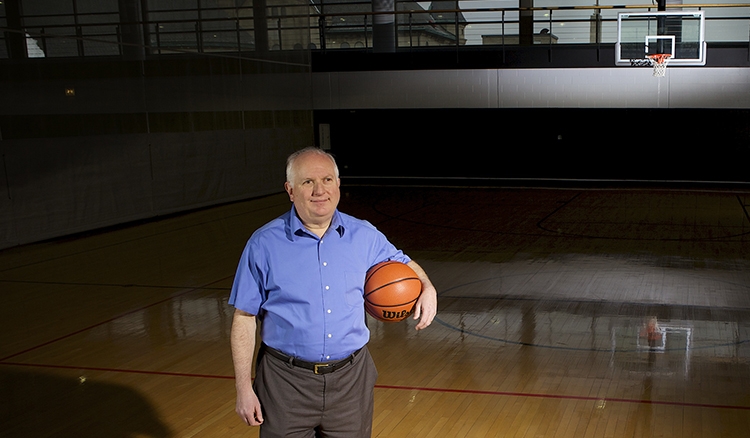 Math professor Jeff Bergen determined the odds of predicting a perfect bracket in this March's NCAA men's basketball tournament to be one in 9.2 quintillion. (DePaul University/Jeff Carrion)
Math professor Jeff Bergen determined the odds of predicting a perfect bracket in this March's NCAA men's basketball tournament to be one in 9.2 quintillion. (DePaul University/Jeff Carrion)
March Madness, the NCAA Division I men's basketball tournament, is nicknamed for its often unpredictable nature. Selection Sunday begins March 11 when the bracket is revealed, including the teams and seeds.
As college basketball fans get set to fill out their brackets, mathematics professor Jeff Bergen offers some perspective on the odds of creating perfect predictions. He calculates that someone filling out a bracket has a one in 9.2 quintillion - or more accurately a one in 9,223,372,036,854,775,808 - chance to correctly pick the results of all of the games.
A DePaul faculty member for over 35 years, Bergen has done extensive research on probability, including in sports and the lottery. He's been quoted in the Chicago Tribune, Chicago Sun-Times, ESPN, USA Today, Time, Science Daily and other national publications discussing the long odds of a perfect bracket.
In this Q&A, Bergen discusses how he determined the longshot odds, bizarre feats that are more likely than a perfect bracket, some ways you can "improve" your chances and his advice to bracket pickers this March Madness season.
Where did the number 9.2 quintillion come from in regards to picking a perfect March Madness bracket?
It's raising two, as in the number of possible winners in each game, to the 63rd power, which is the number of games that are included in the traditional March Madness bracket. So you end up with a one in 9,223,372,036,854,775,808 chance to correctly pick the results of all of the games.
I've been a sports fan for a really long time, so I don't mind playing with these crazy numbers. People get fascinated with the magnitude of the number, but the math is not that complicated. It's just bigger numbers than we usually come across in daily life. I would like to demystify how I got the 9.2 quintillion answer because it would be nice if at every middle or high school the students were coming up with this answer.
To help us put 9.2 quintillion into perspective, what are some other unlikely feats that have better odds than predicting a perfect bracket?
It's more likely to win Powerball and Mega Millions in the same week buying just one ticket for each game than to pick the outcome of all 63 games correctly. Another example: If every person on the planet - about 7.5 billion - began filling out one bracket per minute, it would take over 2,300 years to fill out 9.2 quintillion brackets. And, for those who like politics, it's more likely to predict the winning political party in each of the next 62 presidential elections through the year 2264. A final example is picking six people at random on the street and all of them having the same birthday as you.
There are a lot of people who are college basketball diehards. Can they increase their chances or have better odds at a perfect bracket?
The thing that makes March Madness so interesting to me is that the person who watches college basketball until four in the morning really doesn't have a better shot at a perfect bracket than someone who doesn't watch college basketball at all.
But, there are ways to improve your odds. If you know that a No. 1 seed has never lost to a No. 16 seed, or that a No. 2 seed has only lost to a No. 15 seed eight times in 132 opportunities, your odds of picking a perfect bracket increase to about one in 128 billion.
So what's your advice to those people who would like to fill out a bracket this year?
I don't want to come across as a mathematician trying to ruin the fun of March Madness. The idea is to have fun, even if you probably aren't going to get a perfect bracket. Usually you just want to do the best out of your family or a group of friends. Just enjoy the games and comradery.